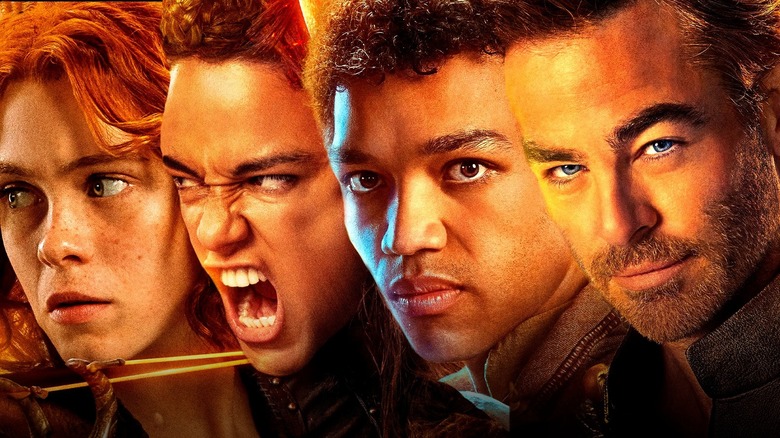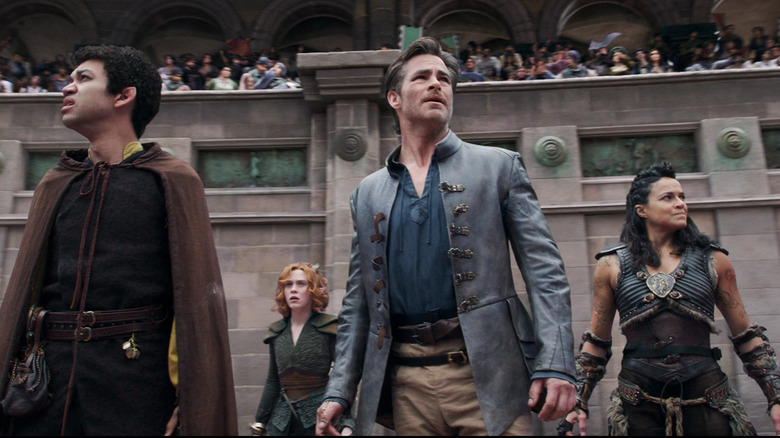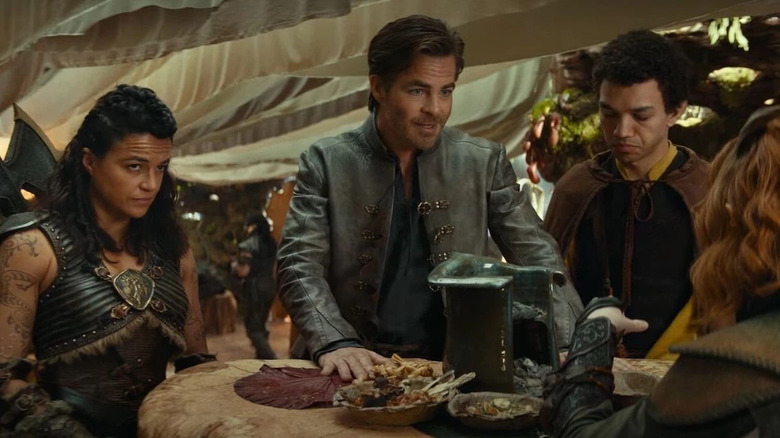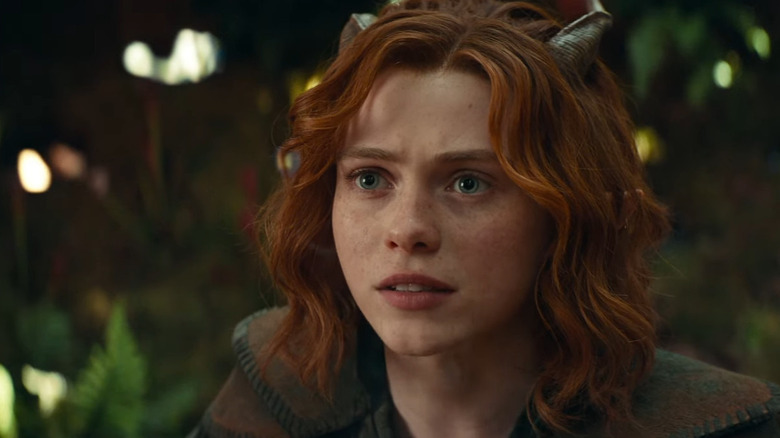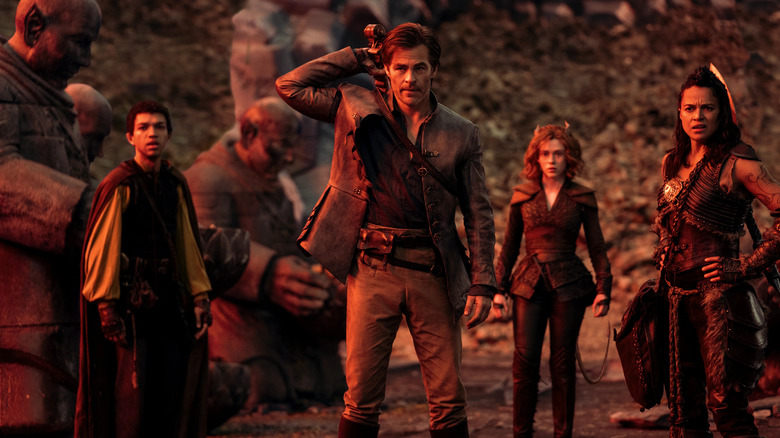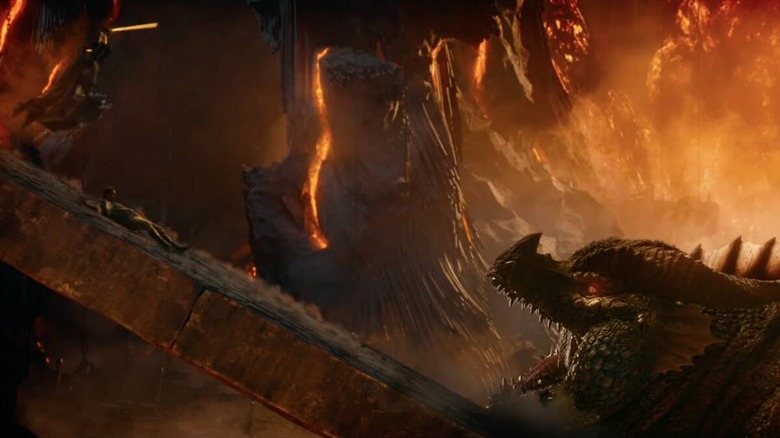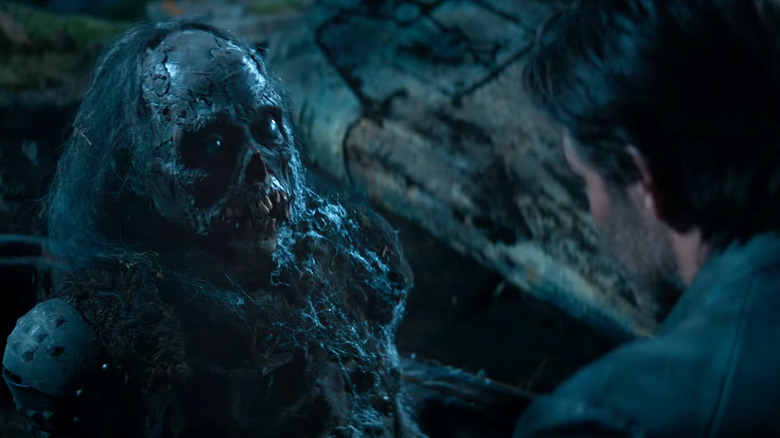High Fantasy Movies Should Take Themselves Seriously - That's Why Dungeons & Dragons Will Fail
We've all been there. You sit down to watch a fantasy movie with some friends (high fantasy, superhero, sci-fi, you name it), and there's that one person present who feels the need to wisecrack throughout the entire film. They pick on creative decisions, poorly-written lines, and awkward moments. It's hard enough to tune that person out — but what if that "person" is the actual movie you're watching? What if the movie is calling itself out? What if the characters in a film are lampshading their own lines, actions, and circumstances?
This might work if the entire tone of the movie is an inherent self-awareness. "A Knight's Tale," for instance, can pull it off because the movie isn't trying to move viewers to tears through a deeply immersive and accurate recounting of 14th-century medieval Europe. It's poking fun at its typically serious setting and amalgamating the past and the present throughout the story. It wears its critical nature on its sleeve and focuses on its satirically romantic plot, regardless of the setting.
For most fantasy films, though, immersion is essential. They absolutely must take themselves seriously if they're going to be successful. It doesn't matter if you're watching a Hobbit struggle with the burden of a magical ring, a monster-hunter slay demons, claimants exterminate one another in horrendous ways as they fight over a throne, or the Dragon Reborn resist the Dark One. Every fantasy story needs to take itself seriously (both within the story and behind the scenes) — and that's why "Dungeons & Dragons: Honor Among Thieves" is destined to fail.
D&D is already fighting an uphill battle
Let's start by stating what should be obvious at this point. Paramount Pictures' adaptation doesn't appear to be taking itself seriously. Now, to be fair, the subject matter here is a bit unpredictable. No, literally, we're talking about a tabletop role-playing game that is player-influenced, is never the same, and features endless combinations of characters, places, accoutrements, and activities. Sure, D&D has been a fan-favorite for fantasy gaming fans for decades, and D&D is featured heavily in shows like "Stranger Things." Sitcoms like "Community" have also assembled iconic installments surrounding the role-playing sensation. Needless to say, D&D is a historical benchmark in the evolution of modern gaming.
But the necessarily unrepeatable nature of the game is also part of what undermines its candidacy as a movie adaptation. From the get-go, a movie in the D&D universe was going to require original characters, plots, and places — which immediately makes it harder for audiences to connect to. It isn't the same as, say, sitting down to watch Amazon Studio's "Wheel of Time" with images of Rand al'Thor and Egwene al'Vere already firmly embedded in everyone's heads. Even if the adaptation was way off compared to most fans' preconceived notions, there was still a familiarity present from the moment the first episode started.
In contrast, there is little to no connection between fans and the new D&D movie. Die-hards and fair-weather fans alike will need to onboard new characters and places as they go along. There are certainly connections to the experience of actually playing the game, but beyond that, the fandom brownie points are going to be a little harder to come by with this one.
D&D already shows an internal apathy for high stakes
The natural disconnect of the new story's material through the absence of recognizable subject matter isn't the only thing holding the new D&D adaptation back. There's also the fact that it doesn't seem to be taking itself seriously from within the story. The trailers leading up to the release of the film have relentlessly harped on a slap-sticky self-awareness and jocular approach to storytelling. In reasonable doses, this could have been a great touch. In larger quantities, it becomes embarrassingly self-aware. This is especially true in the context of how unrealistic a game of D&D can be if you take a step back and consider what's happening as a third-party observer.
In the promotional material alone, this rampant lighthearted humor is everywhere. One trailer cuts right to the chase, jumpstarting the frivolity with a beheading in which Chris Pine's bard persona, Edgin, says of his own impending execution, "Chop it off. Let's do it." This happens moments before Michelle Rodriguez's character, Holga, takes out the entire execution squad while Edgin fruitlessly tries to cut his bonds on a dull staircase.
The scene is funny and entertaining, but it makes it difficult for viewers to remain invested in the emotional gravity of the story. Another way to put it? It doesn't feel real. The scene feels like one big joke with no real stakes or genuine threat to the main characters. To be fair, this is a perfectly acceptable way to make entertainment. It's good for a laugh. But when that's the MO throughout the movie, it's hard to care about much of anything.
The relentless humor of the D&D movie undermines the seriousness
The lighthearted humor in D&D seems to be lavishly used throughout the film. We hear grandiose terms like "the greatest evil the world has ever known." Characters openly discuss irony and jab at one another for not being fun. The protagonists jump down a subterranean hole knowingly called "the Orifice." Even the introduction of the Owlbear — a fearsome creature of D&D lore — is laced with humor. As the sorcerer Simon (Justice Smith) explains the beast to Edgin, we see one of the creature's casualties flying through the background, removing all gravity, fear, and seriousness from an otherwise terrifying scene. From electric guitar riffing in the background to fourth-wall-esque narration, the new D&D starts and ends with humor.
And then, suddenly, in the midst of the goofiness, we get the admittedly talented Chris Pine trying to deliver an emotional line about not quitting. He talks about a past where he lost everything that ever mattered to him, using it to motivate his companions not to quit, or everything will be for naught ... or some such nonsense. See? It's hard to take this stuff seriously when it's shoehorned into the chaotic frivolity. The use of past trauma for present motivation is a standard emotional fantasy trope. But let's be real. It doesn't hold much water in the midst of its self-deprecating context. Why are we supposed to care about characters who won't quit when they don't even take their own surrounding perils seriously?
Fantasy stories need to believe in themselves
J.R.R. Tolkien was arguably the greatest creator of fantasy in the modern era. The Oxford professor's success didn't just come from his creative power. It also stemmed from his commitment to fantasy as a genuine and valuable part of life. In his essay "On Fairy-Stories," Tolkien refutes the negative stereotype of things like "escapism" and defends the concept of fantasy as a universal genre (i.e., not just something for kids). He discusses the need for sub-creators to build high-quality artistic fantasy experiences. In other words, they shouldn't require the suspension of disbelief. Instead, good fantasy should completely immerse those who are willing to engage with it.
Nevertheless, the creator of Middle-earth admits that achieving real fantasy is an art form that is difficult. He points out the prevailing yet false fact that, in his words, "Among those who still have enough wisdom not to think fairy-stories pernicious, the common opinion seems to be that there is a natural connection between the minds of children and fairy-stories, of the same order as the connection between children's bodies and milk." A bit later, he adds, "Fairy-stories have in the modern lettered world been relegated to the 'nursery', as shabby or old-fashioned furniture is relegated to the play-room, primarily because the adults do not want it, and do not mind if it is misused."
At the danger of paraphrasing a remarkably detailed point, fairy stories and fantasy, in general, have become silly escapades that adults treat as children's stories — which naturally makes them easier to criticize than embrace. Tolkien digs straight to the issue a bit later when he declares, "Fantasy thus, too often, remains undeveloped; it is and has been used frivolously, or only half-seriously, or merely for decoration: it remains merely 'fanciful'."
Thor: Ragnarok and D&D: a comparison
Perhaps it's unfair to compare a "Dungeons & Dragons" movie to something with the emotional and spiritual heft of Middle-earth. Instead, let's analyze it next to something more equally paired – "Thor: Ragnarok."
The former is one of Marvel's more famous films. It marks the MCU debut of director Taika Waititi and is widely considered a movie that resurrected the failing Thor franchise nearly from the dead (its prequel, "The Dark World," is consistently ranked amongst the worst MCU movies.) While "Ragnarok" was important turning point for the better in the Thor franchise, the film is also notable because it is markedly goofy. It features similarly ridiculous imagery to D&D, pokes fun at itself, and consistently cracks jokes at its characters' expense.
Yet, "Ragnarok" succeeded because it remained an honest story that doesn't break character. Odin dies a very real death, and Thor and Loki are allowed to genuinely grieve on-screen without interrupting the emotion via jarring comedy. Hela's threat is very real and has organic consequences that fit in with Thor's universe. Asgard really explodes. Thanos leaves everyone quaking in their boots in that end credit shot.
Even when humor is used, the movie doesn't betray its self-awareness. It doesn't buddy up next to the viewer and put its arm around them as it laughs and points at itself. It uses inherently funny personalities like the Grandmaster, Hulk, and Thor himself to channel its humor. It confidently sells the good, the bad, and the ridiculous as a complete package that, with a little dose of the suspension of disbelief, is an enjoyable ride. In fact, the use of humor to support rather than betray the movie gives it a singularly entertaining element that attracted many casual viewers who might've otherwise skipped it.
Could D&D be starting with a bang ... and ending with a whimper?
Surprisingly enough, early Rotten Tomatoes reactions for "Dungeons & Dragons: Honor Among Thieves" have been extremely positive. Indeed, critical praise has been effusive at points. However, even the best commentary simply points to it as being a fun movie, but not with the sort of stakes or memorability that has staying power in the fantasy genre — besides the fact that critics often talk up films that don't have the legs to go the distance.
The point is, even if "Dungeons & Dragons" is a rollicking good time at the theater, that doesn't undermine the point here. There will doubtless be an initial wave of fans who stampede to theaters because they "have" to see the movie. The light-hearted, self-deprecating nature of the film will also likely attract a much larger audience of fickle viewers in search for a good laugh at the expense of a topic that they consider childish and played out. If the buzz keeps up for a few weeks, D&D could even have a nifty theatrical run, especially since it won't have a ton of heavy competition at first. Maybe a sequel will even be announced.
Even if the movie has a temporary surge of success, though, it seems likely that, as time plays out, it will prove to be a house built on the sand. It will lack the core foundation of a believable world and an army of zealous fans who don't just approve of the experience, but (critically) buy into the reality of that experience. Without that base, "Dungeons & Dragons: Honor Among Thieves" is doomed to collapse in on itself under the sheer weight of its own critical, overly-played self-awareness, and be forgotten as nothing more than a footnote in the fantasy genre as a whole.
